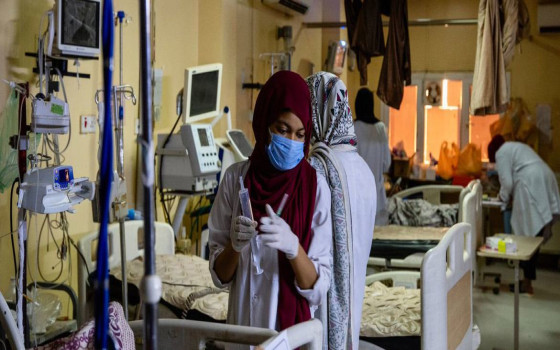
WHO: The health crisis in Sudan has reached dangerous levels

- Europe and Arabs
- Friday , 28 July 2023 7:27 AM GMT
New York - Capitals: Europe and the Arabs
The conflict in Sudan has rapidly exacerbated health threats, with cases of infectious diseases and other afflictions reported among the displaced who have fled to hard-to-reach places with limited health services. According to what was stated in the United Nations news bulletin, of which we received a copy at dawn on Friday, it also stated, "The fighting in Sudan has so far forced 3.4 million people to flee in search of safety inside and outside the country. Approximately 760,000 of them have sought refuge in the Central African Republic and Chad." and Egypt, Ethiopia and South Sudan, where WHO and partners are supporting national authorities to provide emergency health assistance.
Attacks on health facilities continue
The World Health Organization said that the health crisis in Sudan has reached very serious levels, with more than two-thirds of hospitals still out of service, amid increasing reports of attacks on health facilities.
Between 15 April and 24 July 2023, WHO verified 51 attacks on health facilities, causing 10 deaths and 24 injuries, as well as cutting off access to much-needed healthcare.
Dr. Nima Saeed Abid, WHO Representative in Sudan, said:
“The scale of the health crisis is enormous. We are working hard to ramp up our response, delivering critical medical and other emergency health supplies. Although attacks on health facilities and widespread insecurity add to the challenges, we are determined to reach those in need and urge increased donor support so that We can provide services appropriately."
Treating refugees in Chad
In Chad - which receives about 2,500 people per day - WHO and partner organizations have treated more than 1,400 wounded people. The treatment included more than 60 major surgeries. About 70 percent of these cases were caused by gunshots.
In addition, cases of malaria, malnutrition and cholera have been reported among the displaced.
WHO Representative in Chad, Dr Jean-Bosco Ndihokupoyo, said:
“The conflict in Sudan is causing a health crisis affecting an entire region. Chad alone currently hosts more than a quarter of a million people and a similar number of people are expected to arrive in the country by the end of this year. This will dramatically increase health needs, putting great pressure on available health facilities.
suspected cases of cholera
Cases of malaria have also been identified among children under the age of five, as well as suspected cases of yellow fever among some 17,000 people who have sought refuge in the Central African Republic.
Suspected cholera has also been reported in sites in northern Ethiopia receiving large numbers of refugees.
The influx of more than 176,000 people into South Sudan has strained facilities in Renk, where an increase in acute watery diarrhea among children under five has led to a high mortality rate. There is also a significant increase in cases of severe acute malnutrition and measles among these children.
To adequately respond to the crisis, WHO in June launched an emergency appeal for US$145 million. So far, the appeal has received only 10 per cent of the requested amount.
With chances for peace diminishing, the World Health Organization said the health crisis was likely to worsen further.
Enhance disease surveillance
WHO is working with partners to quickly provide emergency assistance. To date, MSF has shipped more than 36 tons of supplies to Chad, where an emergency medical team has also been deployed.
The organization has also provided emergency medical and non-medical supplies to provide care to affected populations in the Central African Republic, Egypt, Ethiopia and South Sudan.
In addition, disease surveillance is being strengthened to guide prevention and enable early detection of potential outbreaks. WHO also provides technical support to national authorities to strengthen the emergency health response.
With few, overburdened or non-existent health facilities in locations hosting people fleeing armed violence in Sudan, WHO and partners are supporting national health authorities to strengthen the provision of essential health services.
The organization stated that improving water, sanitation and hygiene services, conducting vaccination campaigns, as well as strengthening infection prevention and control are among the priority health interventions.












No Comments Found